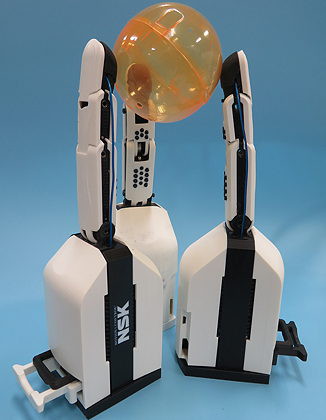By producing individual fingers, the developers are hoping to keep costs low through mass production. This should prove attractive for applications that need smooth finger movements, easy configuration, and optimised placement of the finger modules.
At present, while the price of robot grippers that can grasp a single type or size of object is relatively low, robotic hands with the dexterity to grasp a wide range of objects are extremely expensive.
The individual finger modules being developed by NSK and the German Aerospace Centre can be combined to suit their applications. They can be used to construct custom robot hands that need minimal configuration.
The German Aerospace Centre is contributing a wire drive technology that produces smooth motion and allows gentle gripping of a variety of objects, while NSK is providing a detachable magnetic mechanism that will make it quick and easy to alter the layout of the finger modules simply by pulling a lever to attach or detach them. A digital twin technology was used to develop an algorithm that optimises the placement of the finger modules, depending on the size and shape of the object being grasped.
The developers believe that that their modules will help to mechanise and automate manual tasks that involve grasping a broad variety of objects in industries such as food service, retail, manufacturing, logistics and agriculture.

A trio of finger modules working together hold a plastic ball
They hope that that the technology will accelerate the uptake of robots in industries that require a high degree of dexterity.
NSK talking to robotic systems integrators and existing robot users about how the gripper modules could be used in practical applications. Field trials are expected to start soon.
German Aerospace Centre: X Facebook

